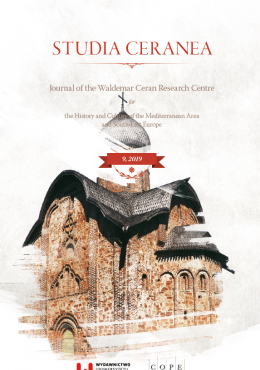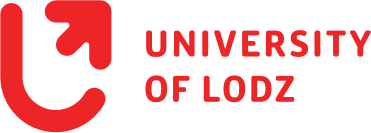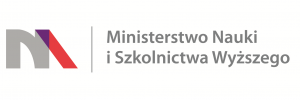Studia Ceranea. Journal of the Waldemar Ceran Research Centre for the History and Culture of the Mediterranean Area and South-East Europe

Studia Ceranea. Journal of the Waldemar Ceran Research Centre for the History and Culture of the Mediterranean Area and South-East Europe
Zadanie Wydanie anglojęzycznych wersji zeszytów rocznika “Studia Ceranea. Journal of the Waldemar Ceran Research Centre for the History and Culture of the Mediterranean Area and South-East Europe” finansowane w ramach umowy nr 501/1/P-DUN/2017 ze środków Ministra Nauki i Szkolnictwa Wyższego przeznaczonych na działalność upowszechniającą naukę
Studia Ceranea is published at the Waldemar Ceran Research Centre for the History and Culture of the Mediterranean Area and South-East Europe (Ceraneum), University of Łódź.
As an international journal, Studia Ceranea accepts contributions written in the standard conference languages (English, French, German, Russian and Italian). Papers should pertain to the history of the Mediterranean, Balkan and Slavic area, and be limited to the period between the 1st century AD and the end of the 17th century.
Our aim is the gradual creation of a scientific journal, interdisciplinary in character, which offers specialist articles, reviews and notes on newly published monographs. Along these lines, we attempt to go beyond the limits of the narrow specializations restricted to history and culture of Byzantine empire or Slavic studies: contributed papers might represent various aspects of Late Antiquity, history of Byzantium and Slavic culture of the Mediterranean Basin and Southeastern Europe, which for all its diversity – we believe – constitutes an integrated entity. Accordingly, the journal uses the methodology and achievements of disciplines employed in the study of Late Antiquity, the Middle Ages and Modern Era, and is ready to face the new challenges posed by contemporary humanist thought.
Publisher: Lodz Univeristy Press
All articles are available in Open Access CC BY-NC-ND
Amount of research and review articles which were published last year: 25
* * *
Rocznik „Studia Ceranea” został powołany do istnienia jako organ wydawniczy Centrum Badan nad Historią i Kulturą Basenu Morza Śródziemnego i Europy Południowo-Wschodniej im. prof. Waldemara Cerana, Ceraneum w ramach struktury organizacyjnej Uniwersytetu Łódzkiego.
Z założenia periodyk ma charakter międzynarodowy, więc przyjmowane doń są prace napisane w językach kongresowych (angielski, francuski, niemiecki, rosyjski i włoski), dotyczące basenu Morza Śródziemnego, Bałkan oraz Słowiańszczyzny, zamykające się w przedziale chronologicznym od I w. n.e. do XVIII stulecia włącznie.
Celem redakcji czasopisma jest tworzenie naukowego pisma o charakterze interdyscyplinarnym, które oferuje studia specjalistyczne, recenzje i noty recenzyjne nowo wydawanych monografii. W ten sposób próbujemy pokonać wąską specjalizację stricte bizantynologiczną lub slawistyczną; artykuły mają przedstawiać różne aspekty późnoantycznej kultury Basenu Morza Śródziemnego (teren Bizancjum) i Europy Południowo-Wschodniej, która jest w swojej różnorodności integralna. W rezultacie „Studia Ceranea” starają się używać metodologii i osiągnięć pokrewnych dyscyplin wykorzystywanych w studiach nad późnym antykiem, średniowieczem i czasami nowożytnymi oraz kulturą Słowian i otwierają się na nowe wyzwania stawiane przez współczesną myśl humanistyczną.
Wydawca: Wydawnictwo Uniwersytetu Łódzkiego
Wszystkie artykuły dostępne są w Otwartym Dostępie (Open Access) na licencji CC BY-NC-ND
Liczba artykułów i recenzji opublikowanych w ostatnim roku: 25
http://ceraneum.uni.lodz.pl/s-ceranea
Komentarze
O CZASOPIŚMIE
- Kolegium redakcyjne „Studia Ceranea”:
- prof. dr hab. Georgi Minczew – redaktor naczelny (Uniwersytet Łódzki)
- dr hab. prof. UŁ Mirosław J. Leszka – zastępca redaktora naczelnego (Uniwersytet Łódzki)
- dr Agata Kawecka – redaktor tematyczny (Uniwersytet Łódzki)
- dr Kirił Marinow – sekretarz naukowy (Uniwersytet Łódzki)
- dr Małgorzata Skowronek – sekretarz naukowy (Uniwersytet Łódzki)
- dr Andrzej Kompa – redaktor tematyczny (Uniwersytet Łódzki)
- dr Ivan Petrov – sekretarz (Uniwersytet Łódzki)
- Rada redakcyjna „Studia Ceranea”:
- doc. dr hab. Hana Gladkova (Uniwersytet Karola w Pradze)
- prof. James Douglas Howard-Johnston (Corpus Christi College, Oxford)
- prof. nadzw. dr Ewald Kislinger (Uniwersytet w Wiedniu)
- prof. Eliza Małek (Uniwersytet Łódzki)
- ks. prof. Józef Naumowicz (Uniwersytet im. Kardynała Stefana Wyszyńskiego)
- dr hab. Szymon Olszaniec (Uniwersytet Mikołaja Kopernika)
- prof. Stefano Parenti (Pontificio Ateneo S. Anselmo, Rzym)
- prof. dr Günter Prinzing (Uniwersytet Jana Gutenberga w Moguncji)
- prof. Rustam Shukurov (Uniwersytet Moskiewski)
- dr Yuri Stoyanov (Uniwersytet w Londynie)
Komentarze
Author fees
This journal charges the following author fees.
Article Submission: 0.00 (PLN)
The journal does not charge for submission of the manuscript.
Article Publication: 0.00 (PLN)
The journal does not charge for processing or publication of the manuscript.
The review process is arranged by double blind system. Every text is subject to at least two reviews.
PUBLICATION ETHICS
Author Responsibilities
Reporting standards: Authors reporting results of original research should present an accurate account of the work performed as well as an objective discussion of its significance. Underlying data should be represented accurately in the manuscript. A paper should contain sufficient detail and references to permit others to replicate the work. Fraudulent or knowingly inaccurate statements constitute unethical behavior and are unacceptable.
Originality and Plagiarism: The authors should ensure that they have written entirely original works, and if the authors have used the work and/or words of others that this has been appropriately cited or quoted.
Multiple, redundant or concurrent publication: An author should not in general publish manuscripts describing essentially the same research in more than one journal or primary publication. Parallel submission of the same manuscript to more than one journal constitutes unethical publishing behavior and is unacceptable.
Acknowledgement of sources: Proper acknowledgment of the work of others must always be given. Authors should also cite publications that have been influential in determining the nature of the reported work.
Authorship of a manuscript: Authorship should be limited to those who have made a significant contribution to the conception, design, execution, or interpretation of the reported study. All those who have made significant contributions should be listed as co-authors. Where there are others who have participated in certain substantive aspects of the research project, they should be named in an Acknowledgement section.
The corresponding author should ensure that all appropriate co-authors (according to the above definition) and no inappropriate co-authors are included in the author list of the manuscript, and that all co-authors have seen and approved the final version of the paper and have agreed to its submission for publication.
Hazards and human or animal subjects: If the work involves chemicals, procedures or equipment that have any unusual hazards inherent in their use, the authors must clearly identify these in the manuscript.
Disclosure and conflicts of interest: All authors should disclose in their manuscript any financial or other substantive conflict of interest that might be construed to influence the results or their interpretation in the manuscript. All sources of financial support for the project should be disclosed.
Fundamental errors in published works: When an author discovers a significant error or inaccuracy in his/her own published work, it is the author’s obligation to promptly notify the journal’s editor or publisher and cooperate with them to either retract the paper or to publish an appropriate erratum.
Editor Responsibilities
Accountability: The editor of a peer-reviewed journal is responsible for deciding which articles submitted to the journal should be published, and, moreover, is accountable for everything published in the journal. In making these decisions, the editor may be guided by the policies of the journal’s editorial board as well as by legal requirements regarding libel, copyright infringement and plagiarism. The editor may confer with other editors or reviewers when making publication decisions. The editor should maintain the integrity of the academic record, preclude business needs from compromising intellectual and ethical standards, and always be willing to publish corrections, clarifications, retractions and apologies when needed.
Fairness: The editor should evaluate manuscripts for intellectual content without regard to race, gender, sexual orientation, religious belief, ethnic origin, citizenship, or political philosophy of the author(s). The editor will not disclose any information about a manuscript under consideration to anyone other than the author(s), reviewers and potential reviewers, and in some instances the editorial board members, as appropriate.
Confidentiality: The editor and any editorial staff must not disclose any information about a submitted manuscript to anyone other than the corresponding author, reviewers, potential reviewers, other editorial advisers, and the publisher, as appropriate.
Disclosure, conflicts of interest, and other issues: The editor will be guided by COPE’s Guidelines for Retracting Articles when considering retracting, issuing expressions of concern about, and issuing corrections pertaining to articles that have been published in International Studies: Interdisciplinary Political and Cultural Journal.
Unpublished materials disclosed in a submitted manuscript must not be used in an editor’s own research without the express written consent of the author. Privileged information or ideas obtained through peer review must be kept confidential and not used for personal advantage.
The editor is committed to ensuring that advertising, reprint or other commercial revenue has no impact or influence on editorial decisions.
The editor should seek to ensure a fair and appropriate peer review process. Editors should recuse themselves (i.e. should ask a co-editor, associate editor or other member of the editorial board instead to review and consider) from considering manuscripts in which they have conflicts of interest resulting from competitive, collaborative, or other relationships or connections with any of the authors, companies, or (possibly) institutions connected to the papers. Editors should require all contributors to disclose relevant competing interests and publish corrections if competing interests are revealed after publication. If needed, other appropriate action should be taken, such as the publication of a retraction or expression of concern.
Involvement and cooperation in investigations: Editors should guard the integrity of the published record by issuing corrections and retractions when needed and pursuing suspected or alleged research and publication misconduct. Editors should pursue reviewer and editorial misconduct. An editor should take reasonably responsive measures when ethical complaints have been presented concerning a submitted manuscript or published paper.
Reviewer Responsibilities
Contribution to editorial decisions
Peer review assists the editor in making editorial decisions and, through the editorial communication with the author, may also assist the author in improving the manuscript.
Promptness
Any invited referee who feels unqualified to review the research reported in a manuscript or knows that its timely review will be impossible should immediately notify the editor so that alternative reviewers can be contacted.
Confidentiality
Any manuscripts received for review must be treated as confidential documents. They must not be shown to or discussed with others except if authorized by the editor.
Standards of objectivity
Reviews should be conducted objectively. Personal criticism of the author is inacceptable. Referees should express their views clearly with appropriate supporting arguments.
Acknowledgement of sources
Reviewers should identify relevant published work that has not been cited by the authors. Any statement that an observation, derivation, or argument had been previously reported should be accompanied by the relevant citation. A reviewer should also call to the editor’s attention any substantial similarity or overlap between the manuscript under consideration and any other published data of which they have personal knowledge.
Disclosure and conflict of interest
Privileged information or ideas obtained through peer review must be kept confidential and not used for personal advantage. Reviewers should not consider evaluating manuscripts in which they have conflicts of interest resulting from competitive, collaborative, or other relationships or connections with any of the authors, companies, or institutions connected to the submission.
Recenzja tekstów prowadzona jest w formacie double blind review. Każdy artykuł sprawdzany jest przez przynajmniej dwóch recenzentów.
ETYKA WYDAWNICZA
Zasady dotyczące autorów
Zasada rzetelności naukowej: Autorzy zgłaszanych do publikacji tekstów są zobowiązani do rzetelnego opisu wykonanych prac badawczych oraz obiektywnej interpretacji wyników. Prace powinny zawierać wystarczająco dużo informacji umożliwiających identyfikację źródeł danych, a także powtórzenie badań. Nierzetelne lub niezgodne z zasadami etyki prezentowanie i interpretowanie danych i wyników badań jest niedopuszczalne i skutkować może wycofaniem tekstu.
Zasady oryginalności pracy: Autorzy mogą zgłaszać do publikacji wyłącznie własne, oryginalne teksty. W przypadku, kiedy wykorzystują badania i/lub słowa innych powinni używać stosownych oznaczeń wskazujących na cytowanie. Plagiat czy fabrykowanie danych są niedopuszczalne.
Zasada udostępnienia danych: Autorzy mogą zostać poproszeni o przedstawienie nieprzetworzonych wyników badań, toteż powinni oni być przygotowani, aby zapewnić dostęp do tych danych, także przez jakiś czas po opublikowaniu pracy.
Zasada przeciwdziałania konfliktom interesów autorów: Autorzy nie powinni publikować tekstów opisujących te same badania w więcej niż jednym czasopiśmie. Zgłaszanie tych samych prac do więcej niż jednego czasopisma uznawane jest za nieetyczne.
Zasady autorstwa pracy: Wszystkie osoby wymienione w zgłoszonej pracy jako autorzy lub współautorzy powinny mieć faktycznie znaczący udział w powstaniu tekstu (projektu, pomysłu, planowaniu, wykonaniu, interpretacji wyników). Również, wszystkie osoby, które miały wpływ na ostateczny kształt pracy powinny zostać wymienione jako współautorzy. Obowiązek upewnienia się, że osoby mające wkład w powstanie artykułu akceptują jego ostateczną formę, leży po stronie autora zgłaszającego tekst do publikacji.
Zasada rzetelności źródeł: Autorzy zgłaszanych prac zobowiązani są zawsze wskazywać publikacje, które zostały przez nich wykorzystane przy tworzeniu artykułu.
Zasady dotyczące błędów w opublikowanych pracach: Jeśli autor/autorzy odkryją znaczące błędy lub nieścisłości w swoich tekstach, zobowiązani są niezwłocznie powiadomić o tym redakcję czasopisma w celu wycofania tekstu bądź skorygowania zaistniałych błędów.
Zasady dotyczące członków redakcji
Odpowiedzialność: Zespół redakcyjny decyduje, które z przysłanych artykułów zostaną skierowane do publikacji oraz ponosi odpowiedzialność za wszystkie treści umieszczane w czasopiśmie. Zespół redakcyjny dba o spójność publikowanych materiałów, wyklucza jakiekolwiek naukowe bądź etyczne kompromisy oraz zawsze jest gotowy do publikowania korekt, errat oraz sprostowań, gdy zaistnieje taka potrzeba.
Zasada fair play: Teksty zgłaszane do publikacji są oceniane pod względem merytorycznym. Kwestie takie jak rasa, płeć, wyznanie, pochodzenie, obywatelstwo czy przekonania polityczne autorów w żaden sposób nie wpływają na ocenę artykułów.
Zasada poufności: Członkowie zespołu redakcyjnego stosują się do zasady poufności, a więc nie ujawniają osobom nieupoważnionym żadnych informacji na temat zgłaszanych do publikacji prac. Osobami upoważnionymi do posiadania tych informacji pozostają jedynie: sami autorzy, wybrani recenzenci, uprawnieni redaktorzy oraz wydawca.
Weryfikacja materiałów już opublikowanych oraz przeciwdziałanie konfliktom interesów:
Zespół redakcyjny, w oparciu o Zasady COPE, może wycofać artykuł z publikacji, wyrazić wątpliwości dotyczące jego zawartości lub zadecydować o potrzebie wprowadzenia korekt do materiałów już opublikowanych. Nieopublikowane artykuły nie mogą być bez pisemnej zgody autorów wykorzystywane przez członków zespołu redakcyjnego ani żadne inne osoby uczestniczące w procedurach wydawniczych.
Decyzje dotyczące publikacji: Zespół redakcyjny odpowiada za podejmowanie decyzji odnośnie tego, które materiały zostaną, a które nie zostaną opublikowane. Przy podejmowaniu decyzji kluczowe są kwestie takie jak: znaczenie naukowe pracy, oryginalność ujęcia problemu, przejrzystość i zgodność z zakresem tematycznym czasopisma.
Zasada rzetelności naukowej: Członkowie zespołu redakcyjnego zobowiązani są dołożyć wszelkich starań dla zachowania integralności w kwestii rzetelności naukowej publikowanych prac. W tym celu mogą oni nanosić stosowne poprawki, a także w przypadku podejrzeń nieuczciwych praktyk (plagiatu, fałszowania wyników badań) podjąć decyzję o wycofaniu tekstu z publikacji.
Redakcja, w razie potrzeby, zawsze gotowa jest opublikować także stosowne sprostowania, wyjaśnienia lub przeprosiny.
Wycofanie tekstu: Zespół redakcyjny może rozważyć wycofanie tekstu jeżeli:
- są wyraźne dowody świadczące o braku wiarygodności wyników badań, fabrykowaniu danych, jak również w przypadku popełnienia niezamierzonych błędów (np. błędy w obliczeniach, błędy metodologiczne);
- wyniki badań zostały wcześniej opublikowane gdzie indziej;
- praca nosi znamiona plagiatu bądź narusza zasady etyki.
Zawiadomienie o wycofaniu tekstu należy traktować jako równoznaczne z wycofaniem artykułu. Zawiadomienie to winno zawierać informacje o osobie (w nagłówku powinien się znaleźć co najmniej tytuł i nazwisko/-a autora/-ów pracy) i powodach (w celu rozróżnienia błędów niezamierzonych od celowych nadużyć) decydujących o wycofaniu tekstu. Wycofywane teksty nie zostają usunięte z opublikowanej wersji czasopisma, ale fakt ich wycofania będzie wyraźnie oznaczony.
Zasady dotyczące recenzentów
Współpraca z zespołem redakcyjnym
Recenzenci uczestniczą w pracach zespołu redakcyjnego i mają wpływ na decyzje podejmowane przez redaktorów. Mogą także, w porozumieniu z autorami, wpływać na ostateczny kształt i doskonalenie publikowanych prac.
Zasada terminowości: Recenzenci zobowiązani są dostarczyć recenzje w ustalonym terminie. Jeżeli z jakichś względów (merytorycznych, braku czasu) nie są oni w stanie dotrzymać terminu bądź podjąć się recenzji, powinni niezwłocznie poinformować o tym fakcie zespół redakcyjny.
Zasada poufności: Wszystkie recenzowane prace mają charakter poufny, co oznacza, że ujawnianie ich osobom trzecim jest niedopuszczalne (za wyjątkiem osób do tego upoważnionych).
Zasada zachowania standardów obiektywności: Recenzje powinny mieć charakter obiektywny. Personalna krytyka autorów prac jest uważana za niestosowną. Wszystkie spostrzeżenia recenzenta powinny zostać odpowiednio uargumentowane.
Zasada rzetelności źródeł: Recenzenci, jeśli zachodzi taka potrzeba, powinni wskazać odpowiednie prace niezacytowane przez autora. Wskazane i zgłoszone redakcji powinny być także wszelkie istotne podobieństwa do innych prac.
Zasada przeciwdziałania konfliktom interesów u recenzentów: Recenzenci nie mogą wykorzystywać recenzowanych prac dla swoich osobistych potrzeb i korzyści. Nie powinni oni również oceniać tekstów, w przypadku których może występować konflikt interesów z autorem/autorami.
Komentarze
- Web of Science Core Collection: Emerging Sources Citation Index
- SCOPUS
- European Reference Index for the Humanities and the Social Sciences (ERIH PLUS)
- Central and Eastern European Online Library (CEEOL)
- The Central European Journal of Social Sciences and Humanities (CEJSH)
- Directory of Open Access Journals (DOAJ)
- EBSCO host research databases
- Slavic Humanities Index
- Bibliographic Database of Polish Academic Journals from Humanities and Humanistic Social Studies (BazHum)
- The Index Copernicus Journals Master List (IC)
- Information Matrix for the Analysis of Journals (MIAR)
- UlrichsWeb
- PKP Index
- Biblioteka Nauki CeON
- Directory of Open Access Scholarly Resources (ROAD): ISSN International Centre and Unesco
Komentarze
Centrum Badań nad Historią i Kulturą Basenu Morza Śródziemnego i Europy Południowo-Wschodniej im. prof. Waldemara Cerana, Ceraneum
Nowy gmach Biblioteki Uniwersytetu Łódzkiego
ul. Matejki 32/38, sala 209, PL – 90–237 Łódź
tel. (0–48–42) 635 64 88
e-mail: s.ceranea@uni.lodz.pl


